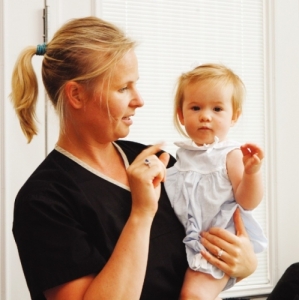Not your average baby talk
By Kenneth Fine
Published in News on July 25, 2009 7:48 PM
News-Argus Video Report

News-Argus/GREG SOUSA
Roxie Wilding, 10 months, and her mother, Dr. Kara Paat, a chiropractor, sign the word "birdie." Roxie knows more than a dozen words in sign language, which she uses to communicate with her parents.
Her eyes fixated on a particular tree, Roxie Wilding brings her thumbs and index fingers together. "Do you see the birdie, Roxie?" her mother, chiropractor Dr. Kara Paat, says. "Is that a birdie?"
Roxie smiles and continues tapping those fingers together.
Her eyes light up when Kara says, "Good job."
Roxie knows exactly what she wants to say, her mother contends.
But at 10 months old, the sign language taught to her by her parents -- a baby-friendly version akin to American Sign Language -- is the only way she can get her message across.
"We laugh because it's just too cute to watch," Kara said. "But we also just love it because she is really telling us what she wants and needs."
After a few minutes of signing "birdie," Roxie's focus has shifted to the pen across the lawn.
She starts to pat her leg frantically when she sees a dog walking within it.
"Oh, is that doggy?" her mother says. "Aw. Good job Roxie. Yeah. That's a doggy."
•
Learning sign language, for Roxie, started long before she was born -- when her mother began teaching new parents about the process "just to kind of introduce this concept" to them.
"I kind of just researched it out because, you know, I had heard, 'Oh you don't want to do it. It can slow their ability to actually speak,'" Kara said. "But the research shows the opposite. ... An average 18-month-old has maybe 50 words they can speak, but the research shows a
signer can do up to 105 or so. That's a big difference."
Then, thanks to family friends, she saw the practice in action.
"It was just awesome," she said. "I just couldn't believe it could be that easy to communicate with a toddler or baby that doesn't talk yet."
So by the time Roxie was born, her mother's mind was firmly set on "talking" to her child long before it would be verbally possible.
•
It started with a wave goodbye.
"Most parents don't realize that that is a sign.
They are signing. They are trying to communicate," Kara said. "When they start doing that, that's your cue."
From there, Kara took more cues from her daughter.
"When I see something she is interested in, like the bird or the dog ... we do that," she said. "And if she points and really likes something, I'll learn it."
But Roxie's signs are not limited to things that fascinate her.
She knows "day-to-day stuff," too -- words like "sleep," "food," "water" and "thank you."
"It's awesome. I notice with her ... she thinks she's communicating. She understands what we're saying and we include her now," Kara said. "It kind of bridges the gap. We're able to include her and she feels like she is part of the conversation."
Maybe that is why Roxie doesn't have quite the temper you might expect from a 10-month-old -- why her tantrums are few and far between.
Her mother thinks so.
"It makes it so much easier. I mean, when she's tired, she'll tell me she wants to sleep," Kara said.
Roxie heard her mother.
She put a hand on her cheek and tilted her head.
"Yeah, Roxie, that's sleep. You see, she knows what we're talking about. This is what parenting should be," Kara said. "I have always believed that they understand. ... Using sign language, it decreases their frustration and their tantrums because they can tell you what they want. So to do it the other way, to go that long just thinking that your kid is upset about everything, not realizing that they are trying to communicate something to you, that they are trying to tell you something, I just can't imagine that."
Roxie's progress has inspired Kara to continue to educate her own patients on the advantages of teaching their babies sign language.
"It's not to do it because it's the thing to do, it's because I want to be able to help my baby feel like she's part of our little world," she said. "A lot of parents think it's a big job to do but it's not. ... I have shown (my husband, Mathew) everything I have done, so any father who wants to be involved, it's not going to be hard. If Roxie can learn them, (they) can learn them."
•
Roxie makes a cradle with her arms.
"Where's your baby, Roxie? Are you showing Mommy baby?" Kara said, reaching for one of her daughter's favorite toys. "That's right. Baby. Here's baby Roxie."
The little girl smiles and brings an open palm to her chin.
"Aw. Thank you? Good job, Roxie," Kara said, mimicking her daughter's successful attempt at the sign for thank you. "Yeah, that's thank you. Isn't she too cute?"
